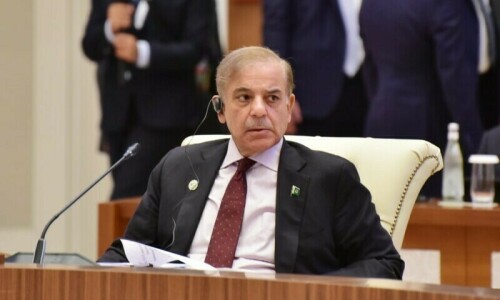ISLAMABAD, Dec 18: Despite considering the increasing water shortage as a vital issue for Pakistan, the most vocal provincial political leadership on water issues shows no sign of seriousness to tackle the tough future challenges as the irrigation bureaucracy dominates the water scene.
This has been revealed in a joint study of the Asian Development Bank (ADB) and the government after consultations with the provincial chief ministers as part of a process spearheaded by the water sector task force constituted by the Friends of Democratic Pakistan.
The study presents Quetta as a city that will become uninhabitable soon. According to it, Karachi is facing serious consequences as there is no mechanism to reach agreements with farmers over voluntary transfer of water to cities. The study advised the international lenders not to pump any more resources in Pakistan unless its political leadership applies political capital to reform urban water and sanitation utilities.
As the two sides have agreed on the involvement of private sector through management contracts in the water utilities but the task force disagreed to the likelihood of attracting reputable private sector operators given perceived ‘security and reputational risks’ in Pakistan but noted that first-class operators from middle-income countries like the Philippines and Brazil would be interested in Pakistan provided unequivocal and robust support by the political leadership.
“The ball is in the court of the chief ministers of the provinces”.
The study found that proportion of total population living in the country’s urban areas has increased from only 17 per cent in 1950 to 33 per cent in 2000 and will account for 50 per cent by 2030.
As this demographic and economic change take place, the management of water system also faces new challenges.
The study has summarised the state of urban water sector in Pakistan as “abysmal” on every imaginable count.
“The coverage is low, service quality is poor, large and growing subsidies are required to maintain even these services, utilities are overstaffed, vast amount of toxic waste is poured into neighbourhood and out to the hinterland and many cities are facing growing challenges in obtaining adequate, good quality sources of water”.
Despite the fact that health and wellbeing of households in and around cities depend on water and sanitation services, the growing cities cast shadows over the surrounding areas from which they need bulk water and to which they discharge concentrated toxic industrial, hospital and human wastes.
“The absence of a reliable water supply and complete inaction in making the necessary institutional changes for securing such a supply means that Quetta will soon be uninhabitable by the present and projected population,” the study noted and added that the city faced the challenge even of its very existence as it is running out of water.
The task force after having meetings with the provincial chief ministers reached the conclusion that the commitment for reforming the system was in provincial capital cities was “high” in Lahore and Peshawar but “non-existent” in Quetta and Karachi.
It said the Punjab chief minister has articulated ‘a water sustainable Lahore’ as a high priority to become a regional agricultural powerhouse and found commendable policy actions.
The task force was also ‘impressed’ by the commitment to urban water reform of the KP government in Peshawar.
In both provinces, the leaderships viewed status quo constituting a serious impediment to competitiveness and wellbeing of people and identified ‘next steps’ to take.
The team, however, met with total disappointment in two other capitals.
The Balochistan government declared ‘water for Quetta’ to be their highest priority but “think there is a magic pipeline from some unknown place that will solve the problem but showed no commitment to addressing the huge groundwater and utility management problems in Quetta”.
“Finally, the Sindh government recognised that water and sewerage for Karachi is important, but did not give the task force a sense that tackling this was a high priority,” the study said. The task force reported “glimmers of hope and commitment in Punjab and KP” but “did not see even glimmers in the cases of Sindh and Balochistan”. In both Sindh and Balochistan, the “provincial leaders understood well the value of a well-performing water utilities and understood that they faced grave challenges in service provision but in both these cases it was apparent to the task force that provincial leaders had other priorities and did not show any interest in exploring the difficult reforms which much put their cities on a sustainable path”.
Describing the performance of water utilities varying between “bad and awful”, the task force said all water utilities were trapped in a vicious cycle in which tariffs are much too low, no resources for maintenance let alone investment, services fail to expand and quality of water declining because of politicised legal and regulatory environment, which is accountable to politicians rather than answerable to customers.
The team put the primary blame of a vicious ‘build, neglect, rebuild’ cycle on Pakistan’s political leadership in poor maintenance and expansion of water utilities and services but said the international donors also have been playing an enabling role by ‘repeatedly pumping good money after bad’.













































Dear visitor, the comments section is undergoing an overhaul and will return soon.